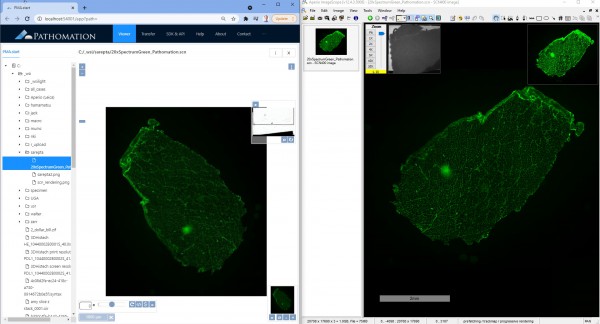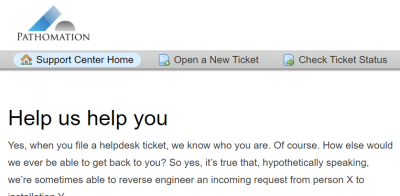User Tools
Sidebar
Add this page to your book
Remove this page from your book
Table of Contents
File format troubleshooting
There are any number of ways that information can be encoded. While we strive to support as many file formats as possible, we can't promise you that we support everything. Occasionally, you'll encounter data that you think should work, but for whatever reason, doesn't.
For some file formats, we know of specific issues that can arise. Check if yours is listed below:
Technology keeps evolving, and vendors keep coming up with more advanced features in their hardware. Sometimes this requires changes in the file format, too, that we may not always be informed about on time.
There's a Pathomation helpdesk for that.
But before you contact us, there are a couple of steps that you can take yourself, depending on the type of data we're talking about:
Slides
Check the filesize of your original slide data. If you expect to see a slide scanned at 20X, but the file that you're trying to host is only 100KB, you're probably missing data. Specifically:
- You may be dealing with a multi-file file format
- You may have downloaded a file from somewhere and something went wrong mid-transfer, resulting in truncated data
If you know the origin of the slide and the scanner hardware vendor, check if the file renders with the vendor's native viewer

Check the storage medium. Though this is rare, it's possible that you have a particular file format that we only support on a specific storage medium. You may be dealing with a slide in S3 e.g., yet we only support the format in Azure and on local disk storage.
When all else fails, contact us. On our helpdesk website, you find additional pointers of information that you can provide us with and that can help troubleshoot the issue.
Annotations
If you know the origin of the annotations, check if they render correctly with the vendor's native software.
This gets a bit technical, so we'll totally forgive you if you skip this step. All the same: If you have a third-party derived format and it can't be read by us, see if it can be read by the software of its original creator. It's quite possible that vendor B adopted file format X from vendor A and made a mistake in the implementation, leading to a variant of format X (let's call it X'). Format X' would could then be read by vendor B, but not by vendor A anymore, and chances are that under these conditions we're not able to either.
When all else fails, contact us. On our helpdesk website, you find additional pointers of information that you can provide us with and that can help troubleshoot the issue.
Other formats
There are a number of other formats that are used throughout the Pathomation platform (including PMA.core): CSV, XLS, XML, ARFF… If you find yourself working with any of these file formats and run into trouble; the general guidance is to see if the file under suspicion is interpreted correctly by the software it came from.
If the file can still be read by the original software it's created with, it's possible we made a mistake implementing support for it on our side. You can then contact us. On our helpdesk website, you find additional pointers of information that you can provide us with and that can help troubleshoot the issue.

